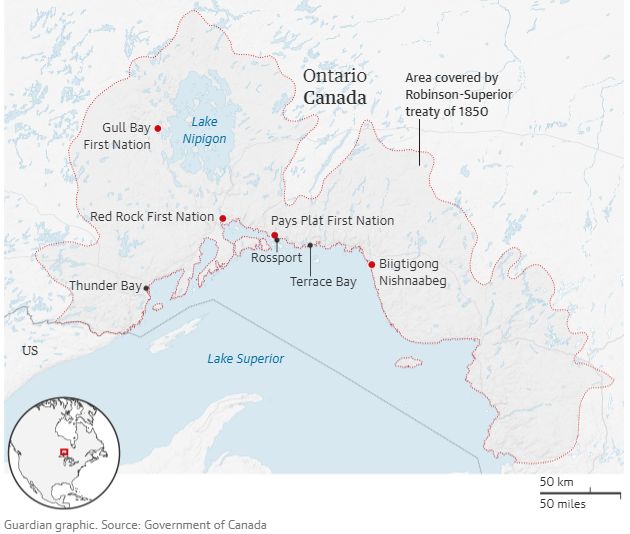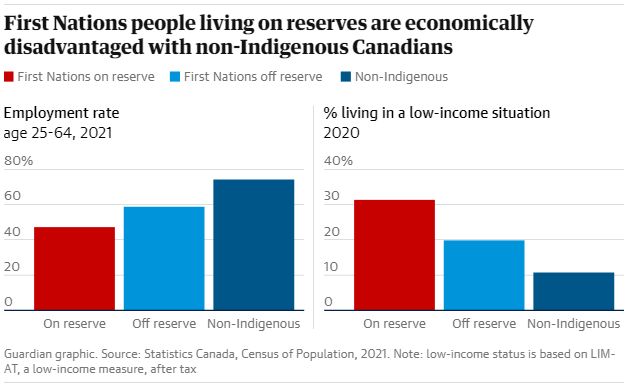Canada Owes First Nations Billions After Making ‘Mockery’ of Treaty Deal, Top Court Rules

An “egregious” refusal by successive Canadian governments to honor a key treaty signed with Indigenous nations made a “mockery” of the deal and deprived generations of fair compensation for their resources, Canada’s top court has ruled.
But while the closely watched decision will likely yield billions in payouts, First Nation chiefs say the ruling adds yet another hurdle in the multi-decade battle for justice.
In a scathing and unanimous decision released on Friday, Canada’s supreme court sharply criticized both the federal and Ontario governments for their “dishonourable” conduct around a 174-year-old agreement, which left First Nations people to struggle in poverty while surrounding communities, industry and government exploited the abundant natural resources in order to enrich themselves.
“For almost a century and a half, the Anishinaabe have been left with an empty shell of a treaty promise,” the court wrote in the landmark ruling.
The stark language reflects the enduring legacy of the colonial project first envisioned by the British government and continued after Canada gained independence and offers yet another example of major cases tilting towards Indigenous peoples. The court decision to highlight “egregious” ways in which governments have treated their agreements with nations could have far-reaching consequences, both for the affected communities and the country.
The case centered on a treaty signed in 1850 between the British Crown and a group of Anishinaabe nations on the shores of Lakes Huron and Superior. Known as the Robinson Treaties, the agreements, covering 35,700 sq miles (92,400 sq km) of land, included a rare “augmentation clause” that promised to increase annual payments “from time to time” as the land generated more wealth – “if and when” that payment could be made without the Crown incurring a loss.

Over the next 174 years, the lands and waters covered by the deal generated immense profits for companies – and substantial revenues for the province of Ontario. But in 1874, the annuities were capped in at $4 a person and never increased.
“Today, in what can only be described as a mockery of the Crown’s treaty promise to the Anishinaabe of the upper Great Lakes, the annuities are distributed to individual treaty beneficiaries by giving them $4 each,” the court wrote, singling out the “shocking” figure paid to beneficiaries. “The Crown has severely undermined both the spirit and substance of the Robinson Treaties.”
Among the key issues the court tackled was the novel “augmentation clause” in the treaty. The justices said that even though the treaty does not promise to pay a certain sum of money, “no party doubts that the Crown was able to increase the annuities beyond $4 per person without incurring loss, and that it should have exercised its discretion to do so.”
Finding the nation-to-nation agreement was an alliance of equals, the court called on the Crown to return “to the foundations of the treaty” and to “engage the honour of the Crown”, by increasing the annual payments. Failing to do so would be “patently dishonourable”, wrote justice Mahmud Jamal.
Lawrence Wanakamik, chief of Whitesand First Nation, told reporters the decision had been a “long time coming”.

“We have suffered all those years no economic benefits to our community. It’s been hard over the years trying to make a whole community for Whitesand,” he said, holding back tears. “We do have other struggles to contend with, but you know, with this settlement … we’ll have a better community from this point on.”
Crucially, the ruling does not award a settlement to Superior Anishinaabe First Nations, who had previously argued they are owed C$126bn in back payments. An Ontario court ruled on this claim last year, but the supreme court ordered the ruling be held in reserve pending Friday’s decsion. The court also said the settlement ruling must remain unreleased for another six months so that both parties could come to an agreement.
But Wilfred King, chief of Gull Bay First Nation, said he was “a bit disappointed” by key parts of the ruling, namely the way in which the Crown proposes the figure it feels is fair.
“How do you negotiate when one side says, ‘Well, we think this is a fair amount?’”
Ontario has previously argued in court that far from growing rich, it has spent nearly C$4.2bn in its efforts to settle the north and open it up to industry.
For nations that have waited decades for compensation, the prospect of more legal wrangling is “unfortunate”, said King.
“Both Crowns – Canada and Ontario – were admonished by the court for making a mockery of the treaty. And it’s important that both Crowns understand why they were being criticized,” he continued.
The supreme court has given Ontario a six-month timeline to propose a new settlement with the First Nations groups on Lake Superior. The justices warned that if governments couldn’t settle fair compensation, the court would step in.
“I’m hopeful that the Crown comes to the table with clean hands this time and try to come to an amicable agreement,” said King. “We knew we were never going to come close to the C$126bn we believe we’re owed. But it just showed you the vast amount of resources that have been extracted from our territory without fair compensation.”
Leyland Cecco is a Canadian freelance photojournalist focusing on the intersection of culture, economics and the environment. He has covered the Middle East and North Africa for the last three years, and currently divides his time between Cairo and Toronto.
A message from Betsy Reed, editor of the Guardian US
I hope you appreciated this article. Before you move on, I wanted to ask if you would consider supporting the Guardian’s journalism during one of the most consequential news cycles of our lifetimes.
From Elon Musk to the Murdochs, a small number of billionaire owners have a powerful hold on so much of the information that reaches the public about what’s happening in the world. The Guardian is different. We have no billionaire owner or shareholders to consider. Our journalism is produced to serve the public interest – not profit motives.
And we avoid the trap that befalls much US media: the tendency, born of a desire to please all sides, to engage in false equivalence in the name of neutrality. We always strive to be fair. But sometimes that means calling out the lies of powerful people and institutions – and making clear how misinformation and demagoguery can damage democracy.
From threats to election integrity, to the spiralling climate crisis, to complex foreign conflicts, our journalists contextualise, investigate and illuminate the critical stories of our time. As a global news organisation with a robust US reporting staff, we’re able to provide a fresh, outsider perspective – one so often missing in the American media bubble.
Around the world, readers can access the Guardian’s paywall-free journalism because of our unique reader-supported model. That’s because of people like you. Our readers keep us independent, beholden to no outside influence and accessible to everyone – whether they can afford to pay for news, or not.
Betsy Reed, Editor Guardian, US
